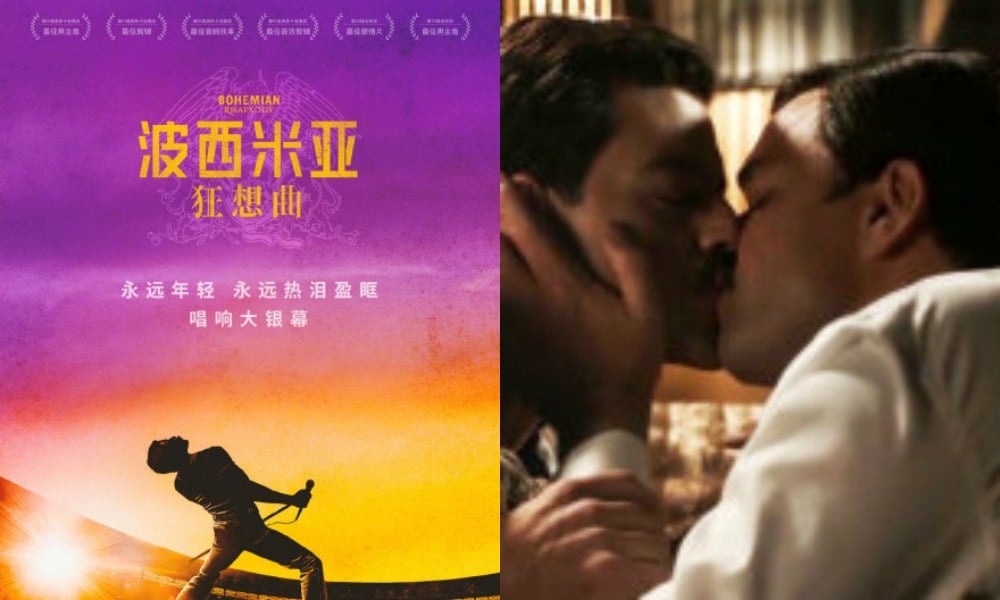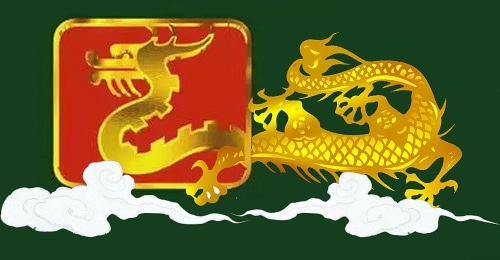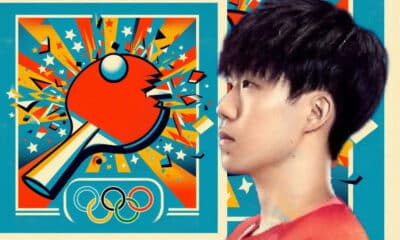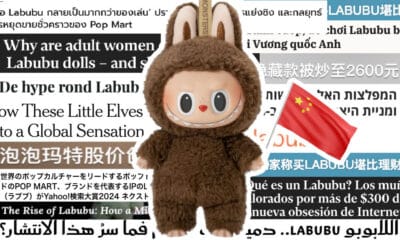China Arts & Entertainment
Why the Gay Kisses in ‘Bohemian Rhapsody’ Won’t Make It to Chinese Cinemas
Fresh off its Oscar wins, “Bohemian Rhapsody” will hit theaters in China, but some scenes won’t make it to the Mainland.
Published
6 years agoon

First published
The award-winning movie Bohemian Rhapsody is set to debut in mainland China later this month but foreign media reports on censorship of gay scenes within the movie have prompted animated discussion on Chinese social media. Why are these scenes being cut at all? What’s on Weibo explains.
In March 2019, Bohemian Rhapsody, a biopic on the life and career of Freddie Mercury, will be released in theatres across mainland China, with various Chinese news outlets identifying the Chinese National Alliance of Arthouse Cinema (全国艺术电影联盟) as the movie’s distributor.
The National Alliance of Arthouse Cinema is a non-profit film distribution organization established in 2016. According to QDaily, the organization cooperates with major Chinese cinemas in distributing films throughout the country and has some 1500 member cinemas – about 3% of the country’s total number of movie theatres.
Various foreign media outlets, including The Guardian and The Hollywood Reporter, report that portrayals of drug use and several intimate kisses between Mercury and other male characters will be cut from the Chinese version of the film, a decision that has been regarded as controversial by social media users both inside and outside of China.
Film Censorship in China
The Chinese movie industry is an area that has always been subjected to strict control and censorship. The first movie censorship laws in China were implemented as early as the 1930s, carried out by the Central Film Inspection Committee since 1931, with the purpose of legally prohibiting movies deemed “offensive to the Chinese public” (Pang 2011, 463; Zhu 2003, 202).
Theatrical releases in China are controlled by the SARFT (State Administration for Radio, Film, and Television), which is overseen by the Propaganda Department of the Communist Party (Grimm 162-163).
Throughout the years, China’s censorship apparatus has affected the screening of hundreds of foreign films in the PRC in a multitude of ways. The famous Titanic scene in which Rose (Kate Winslet) poses naked for Jack (Leonardo DiCaprio), for instance, was cut from the Chinese version. In Mission: Impossible III a scene in which Ethan Hunt (Tom Cruise) distracts two Chinese henchmen and kills one was also eliminated in China.
In March 2017, a new film censorship law came into force in mainland China, officially titled the ‘Film Industry Promotion Law of the People’s Republic of China’ (中华人民共和国电影产业促进法), laying out the regulations for prohibited content and content that must be cut. The law applies to the various pre-shooting and pre-screening stages, and is meant to “promote the healthy and prosperous development of the film industry.”

The law, as outlined here, stipulates that, among other things, movies cannot contain any elements that, for example:
- violate, resist, or undermine the basic principles of the constitution
- “harm national unity, sovereignty, or territorial integrity” or “damage the national dignity”
- “slander ethnic cultural traditions” or “instigate hostility towards ethnic groups”
- damage the “mental health of minors”
- harm China’s “social morality” or disturb the “order of society”
- promote “obscenities,” “gambling,” “drug abuse,” or “violence”
Although some of the stipulations in the law are straightforward, there are also many parts that are vague. How does one determine what is harmful to the “mental health of minors”? Is there an objective way to judge whether a film is “hurting the feelings of ethnic groups”? What is the censors’ definition of “obscene”?
In the end, these regulations leave ample room for the main censorship body, the SARFT, to determine case-by-case how and if foreign films that have been allowed to be screened in mainland China should be altered to stay ‘in line’ with the country’s strict censorship policies.
Banning Gay Content?
Homosexuality is no longer illegal in mainland China since 1997, and has been removed from a list of mental illnesses since 2001, but bans on content displaying homosexuality have made headlines over the years, highlighting the general discomfort of Chinese regulators towards gay-themed dramas and films.
In early 2016, Chinese State Administration released new regulations banning “homosexuality” in filmography for conveying “unnatural” values of love (Guangming Online). That same year, China’s popular gay-themed web series Addiction (上瘾) was yanked by censors due to disapproval at the plot’s lengthy exploration of homosexuality. A year later, Chinese regulators laid out rules stating that online videos showing “displays of homosexuality” were no longer allowed. In 2018, gay romance Call Me by Your Name was suddenly pulled from the Beijing film festival.
At the same time, there is no shortage of examples that show homosexuality has some leeway in China’s (online) film and media landscape. Last year, 2018, saw the mainland release of gay movie Seek McCartney (Looking for Rohmer) (寻找罗麦). Thai gay-themed film Fathers was released on popular video platform Bilibili in 2017.

Chinese version of Thai gay-themed film “Fathers” or “Two Fathers”
An online video showing a young Chinese man coming out to his parents as gay became an online hit in 2015. And now, in 2019, Bohemian Rhapsody, centered around one of the LGBT community’s most global cultural icons, is set to hit the big screen in China – albeit censored.
Mixed signals? Confused censors? Not necessarily. According to renowned Chinese sexologist Li Yinhe, the Chinese government is not against homosexuality per se. At an Amsterdam symposium in 2014, the LGBT rights activist stated that “the government is not against homosexuality, but against sex in general.”
Such a stance was made explicit with the March 2017 Film Industry Promotion Law, which, in the words of a Beijing-based film director, has since forced many in the industry to “prioritize education over art” so that their work can get past the censors. Any scenes including (explicit) portrayals of prostitution, LGBT relations, extramarital affairs, polyamory, or pornography, will generally not be permitted to reach a large Chinese audience, wrapped in conservative rhetoric that accuses such scenes of “promoting obscenities” or being “harmful to the healthy development of Chinese minors.”

At a time of a rapidly transforming (and aging) China, “healthy content” is mostly the kind of content that depicts the conventional family – marriage and children – as the cornerstone of a stable Chinese society. Depictions of Freddy Mercury kissing other men, apparently, does not fit the ideal family model propagated by Chinese authorities; with the government’s ongoing trumpeting of the two-child policy, homosexuality’s refusal to be dictated by the laws of biological fertility may also be one of the many reasons motivating the censors’ decision to tone down the ‘gayness’ of Bohemian Rhapsody.
Weibo Responses
On Weibo, news about censorship of the Chinese release of Bohemian Rhapsody became a trending topic.
Although a large number of netizens are happy that the movie will be released in China, there are also many dissatisfied with the censorship that comes with it.

Some people argue that the selective cutting of scenes will be detrimental to the overall quality of the movie. Popular Weibo user ‘Gongyuan 1874’ (@公元1874), a self-proclaimed ‘author’ and ‘cultural critic’ with more than 3 million online followers, wrote a lengthy post on February 28 in which he describes Freddie Mercury as a “rebel fighter” whose life was defined by freedom. The author argues that the “artistic value of the movie is “greatly reduced” by censoring those parts that show Mercury letting himself go.
Some commenters are so disgruntled at the movie’s censorship that they are boycotting it. One Weibo user wrote: “Because I want to protest against the unfair treatment of LGBT by authorities, I will not go and see the edited version of Bohemian Rhapsody.”
“I’d advise everyone to go and get a pirated version of the movie,” another commenter writes: “Homosexuality and drugs were a part of Freddie Mercury’s life, to ‘castrate’ this movie is disrespectful [to his memory].”
There are also some more moderate netizens, well aware of the current restrictions placed on the film and TV industry, who argue that cutting some scenes – total scene time cut from the Chinese release is alleged to be no longer than two minutes – will leave the message conveyed by the movie unharmed, and that viewers should be grateful such a film is being screened in China at all.
“I have been watching the comments about Bohemian Rhapsody and the deleted gay scenes,” one music blogger writes: “Some people think it’s an insult to Freddie Mercury, and say we should boycott the movie. I think this kind of reasoning doesn’t show much goodwill.”
The blogger argues: “I think Freddie Mercury is a great singer, a well-respected artist, and an icon of his time – not just a representative for gays. The exploration of his own identity was a major influence in his life and artistic work, but if you insist on discussing the content of the film, the legendary experiences of the band…their artistic achievements and rock ‘n roll spirit are all relevant – all in all, don’t hold on to sexual orientation [as the most crucial theme].”
There are some who might agree, asking “is it necessary to screen those deleted gay scenes in China?”
Amid hundreds of comments on the issue, there is no clear consensus. While some point out that the Chinese release of a movie such as Bohemian Rhapsody is a sign of ‘progress’ in a strictly controlled media environment, others see its censorship as doing a disservice to the film’s main themes of artistic freedom and LGBT emancipation.
However, in an age where censors even go after heterosexual, ancient Chinese dramas, the mere entry of Bohemian Rhapsody into the Mainland perhaps suggests an atypical loosening of the stranglehold being placed on China’s TV and film industry. Any way the wind blows, apparently, does really matter to Chinese netizens.
By Manya Koetse , edited by Eduardo Baptista
References [online sources via in-text hyperlinks]
Grimm, Jessica. 2015. “The Import of Hollywood Films in China: Censorship and Quotas.” Syracuse J. Int’l L. & Com. 43 (1): 155-190.
Pang, Laikwan. 2011. “The State Against Ghosts: A Genealogy of China’s Film Censorship Policy.” Screen 52 (4): 461-476.
Zhu, Ying. 2003. Chinese Cinema During the Era of Reform: The Ingenuity of the System. Westport, Connecticut, London: Prager.
Spotted a mistake or want to add something? Please email us.
©2019 Whatsonweibo. All rights reserved. Do not reproduce our content without permission – you can contact us at info@whatsonweibo.com.
Manya is the founder and editor-in-chief of What's on Weibo, offering independent analysis of social trends, online media, and digital culture in China for over a decade. Subscribe to gain access to content, including the Weibo Watch newsletter, which provides deeper insights into the China trends that matter. More about Manya at manyakoetse.com or follow on X.

China ACG Culture
A Very Short Guide to China’s Most Popular Designer Toys
Published
1 week agoon
July 6, 2025
In our last article, we’ve determined how Wakuku’s rise is not just about copying & following in Labubu’s footsteps and more about how China is setting the pace for global pop culture IPs. I now want to give you a small peek into the main characters in the field that are currently relevant.
Even if these dolls aren’t really your thing, you’ll inevitably run into them and everything happening around them.
Before diving into the top trending characters, a quick word on the challenges ahead for Labubu & co:
🚩 Bloomberg Opinion columnist Shuli Ren recently argued that Labubu’s biggest threat isn’t competition from Wakuku or knockoffs like “Lafufu,” but the fragility of its resale ecosystem — particularly how POP MART balances supply, scarcity, and reseller control.
Scarcity is part of what makes Labubu feel premium. But if too many dolls go to scalpers, it alienates real fans. If scalpers can’t profit, Labubu risks losing its luxury edge. Managing this dynamic may be POP MART’s greatest long-term challenge.
🚩 Chinese Gen Z consumers value authenticity — and that’s something money can’t manufacture. If China’s booming IP toy industry prioritizes speed and profit over soul, the hype may die out at a certain point.
🚩 The same goes for storytelling. Characters need a solid universe to grow in. Labubu had years to build out its fantasy universe. Cute alone isn’t enough — characterless toys don’t leave a lasting impression and don’t resonate with consumers.

Examples of popularity rankings of Chinese IP toys on Xiaohongshu.
With that in mind… let’s meet the main players.
On platforms like Xiaohongshu, Douyin, and Weibo, users regularly rank the hottest collectible IPs. Based on those rankings, here’s a quick who’s-who of China’s current trend toy universe:

1. Labubu (拉布布)
Brand: POP MART
Creator: Kasing Lung
Year launched: 2015 (independent), 2019 with POP MART.
The undisputed icon of China’s trend toy world, Labubu is a mischievous Nordic forest troll with big eyes, nine pointy teeth, and bunny ears. Its quirky, ugly-cute design, endless possibilities of DIY costume changes, and viral celebrity endorsements have made it a must-have collectible and a global pop culture phenomenon.

2. Wakuku (哇库库)
Brand & Creator: Letsvan, backed by QuantaSing Group
Year launched: 2024 with first blind box
Wakuku, a “tribal jungle hunter” with a cheeky grin and unibrow, is seen as the rising star in China’s trend toy market. Wakuku’s rapid rise is fueled by celebrity marketing, pop-up launches, and its strong appeal among Gen Z, especially considering Wakuku is more affordable than Labubu.

3. Molly (茉莉)
Brand: POP MART
Designer: Kenny Wong (王信明)
Year launched: 2006 (creator concept); POP MART 2014, first blind boxes in 2016
Molly is a classic trend toy IP, one of POP MART’s favorites, with a massive fanbase and long-lasting popularity. The character was allegedly inspired by a chance encounter with a determined young kid at a charity fundraiser event, after which Kenny Wong created Molly as a blue-eyed girl with short hair, a bit of a temperament, and an iconic pouting expression that never leaves her face.

4. SKULLPANDA (骷髅熊猫)
Brand: POP MART
Creator: Chinese designer Xiong Miao
Year launched: 2018 (creator concept); POP MART 2020
Skullpanda is one of POP MART’s flagship IPs —it’s a goth-inspired fantasy design. According to POP MART, SKULLPANDA journeys through different worlds, taking on various personas and living out myriad lives. On this grand adventure, it’s on a quest to find its truest self and break new ground all while contemplating the shape of infinity.

5. Baby Zoraa
Brand: TNT SPACE
Creator: Wang Zequn, CEO of TNT SPACE
Year launched: 2022, same year as company launch
Baby Zoraa is cute yet devlish fierce and is one of the most popular IPs under TNT SPACE. Baby Zoraa is the sister of Boy Rayan, another popular character under the same brand. Baby Zoraa’s first blind box edition reached #1 on Tmall’s trend toy sales charts and sold over 500,000 units.

6. Dora (大表姐)
Brand: TNT SPACE
Year Launched: 2023
Dora is a cool, rebellious “big sister” figure, instantly recognizable for her bold attitude and expressive style. She’s a Gen Z favorite for her gender-fluid, empowering persona, and became a breakout sucess under TNT when it launched its bigger blind boxes in 2023.

7. Twinkle Twinkle [Star Man] (星星人)
Brand: POP MART
Creator: Illustrators Daxin and Ali
Year launched: In 2024 with POP MART
This character has recently skyrocketed in popularity as a “healing star character” inspired by how stars shine even in darkness. POP MART markets this character as being full of innocence and fantasy to provide some relaxation in this modern society full of busyness and pressure.

8. Hirono (小野)
Brand: POP MART
Creator: Lang
Year launched: In 2024 with POP MART
This freckled, perpetually grumpy boy has a wild spirit combining introversion and playful defiance. Hirono highlights the subtle fluctuations of life, its ups and downs, incorporating joy, sadness, fear, and more – a personification of profound human emotions.

9. Crybaby (哭娃)
Brand: POP MART
Creator: Thai artist Molly Yllom (aka Nisa “Mod” Srikamdee)
Year launched: 2017 (creator concept), 2023 POP MART launch
Like Wakuku, Crybaby suddenly went from a niche IP to a new hot trend toy in 2025. Together with Wakuku, it is called the “next Labubu.” Thai artist Molly Yllom created the character after the loss of her beloved dog. Crybaby is a symbol of emotional expression, particularly the idea that it’s okay to cry and express feelings.

10. Pouka Pouka (波卡波卡)
Brand: 52TOYS
Creator: Ma Xiaoben
Year launched: 2025
With its round, chubby face, squirrel cheeks, playful smile, and soft, comforting appearance, Pouka Pouka aims to evoke feelings of warmth, healing, and emotional comfort.
Other characters to watch: CiciLu, Panda Roll (胖哒幼), NANCI (囡茜), FARMER BOB (农夫鲍勃), Rayan, Ozai (哦崽), Lulu the Piggy (LuLu猪), Pucky (毕奇).
We’re still working on this list!
By Manya Koetse
(follow on X, LinkedIn, or Instagram)
Spotted a mistake or want to add something? Please let us know in comments below or email us. First-time commenters, please be patient – we will have to manually approve your comment before it appears.
©2025 Whatsonweibo. All rights reserved. Do not reproduce our content without permission – you can contact us at info@whatsonweibo.com.
China ACG Culture
The Next Labubu: What the Rise of Wakuku Tells Us About China’s Collectible Toy Wave
From ugly-cute rebellion to a new kind of ‘C-pop,’ the breakout success of Wakuku sheds light on Chinese consumer culture and the forces driving China’s trend toy industry.
Published
1 week agoon
July 6, 2025
Wakuku is the most talked-about newcomer in China’s trend toy market. Besides its mischievous grin, what’s perhaps most noteworthy is how closely Wakuku follows the marketing success of Labubu. As the strongest new designer toy of 2025, Wakuku says a lot about China’s current creative economy — from youth-led consumer trends to hybrid business models.
As it is becoming increasingly clear that Chinese designer toy Labubu has basically conquered the world, it’s already time for the next made-in-China collectible toy to start trending on Chinese social media.
Now, the name that’s trending is Wakuku, a Chinese trend toy created by the Shenzhen-based company Letsvan.
In March 2025, a new panda-inspired Wakuku debuted at Miniso Land in Beijing, immediately breaking records and boosting overall store revenue by over 90%. Wakuku also broke daily sales records on May 17 with the launch of its “Fox-and-Bunny” collab at Miniso flagship stores in Shanghai and Nanjing. At the opening of the Miniso Space in Nanjing on June 18, another Wakuku figure sold out within just two hours. Over the past week, Wakuku went trending on Chinese social media multiple times.

From left to right: the March, May, and June successful Wakuku series/figurines
Like Labubu, Wakuku is a collectible keychain doll with a soft vinyl face and a plush body. These designer toys are especially popular among Chinese Gen Z female consumers, who use them as fashion accessories (hanging them from bags) or as desk companions.
We previously wrote in depth about the birth of Labubu, its launch by the Chinese POP MART (founded 2010), and the recipe for its global popularity in this article, so if you’re new to this trend of Chinese designer toys, you’ll want to check it out first (link).
Labubu has been making international headlines for months now, with the hype reaching a new peak when a human-sized Labubu sold for a record 1.08 million RMB (US$150,700), followed by a special edition that was purchased for nearly 760,000 RMB (US$106,000).
Now, Wakuku is the new kid on the block, and while it took Labubu nine years to win over young Chinese consumers, it barely took Wakuku a year — the character was created in 2022–2023, made its retail debut in 2024, and went viral within months.
Its pricing is affordable (59–159 RMB, around $8.2-$22) and some netizens argue it’s more quality for money.
While Labubu is a Nordic forest elf, Wakuku is a tribal jungle warrior. It comes in various designs and colors depending on the series and is sold in blind boxes (盲盒), meaning buyers don’t know exactly which design they’re getting — which adds an element of surprise.
➡️ There’s a lot to say about Wakuku, but perhaps the most noteworthy aspect is how closely it mirrors the trajectory of POP MART’s Labubu.
Wakuku’s recent success in China highlights the growing appeal and rapid rise of Chinese IPs (beyond its legal “intellectual property” meaning, ‘IPs’ is used to refer to unique cultural brands, characters, or stories that can be developed into collectibles, merchandise, and broader pop culture phenomena).
Although many critics predict that the Labubu trend will blow over soon, the popularity of Wakuku and other Labubu-like newcomers shows that these toys are not just a fleeting craze, but a cultural phenomenon that reflects the mindset of young Chinese consumers, China’s cross-industry business dynamics, and the global rise of a new kind of ‘C-pop.’
Wakuku: A Cheeky Jungle Copycat
When I say that Wakuku follows POP MART’s path almost exactly, I’m not exaggerating. Wakuku may be portrayed as a wild jungle child, but it’s definitely also a copycat.
It uses the same materials as Labubu (soft vinyl + plush), the name follows the same ABB format (Labubu, Wakuku, and the panda-themed Wakuku Pangdada), and the character story is built on a similar fantasy universe.
In fact, Letsvan’s very existence is tied to POP MART’s rise — the company was only founded in 2020, the same year POP MART, then already a decade old, went public on the Hong Kong Stock Exchange and became a dominant industry force.
In terms of marketing, Wakuku imitates POP MART’s strategy: blind boxes, well-timed viral drops, limited-edition tactics, and immersive retail environments.
It even follows a similar international expansion model as POP MART, turning Thailand into its first stop (出海首站) — not just because of its cultural proximity and flourishing Gen Z social media market, but also because Thailand was one of the first and most successful foreign markets for Labubu.
Its success is also deeply linked to celebrity endorsement. Just as Labubu gained global traction with icons like BLACKPINK’s Lisa and Rihanna seen holding the doll, Wakuku too leans heavily on celebrity visibility and entertainment culture.
Like Labubu, Wakuku even launched its own Wakuku theme song.
Since 2024, Letsvan has partnered with Yuehua Entertainment (乐华娱乐) — one of China’s leading talent agencies — to tap into its entertainment resources and celebrity network, powering the Wakuku marketing engine. Since stars like Esther Yu (虞书欣) were spotted wearing Wakuku as a jeans hanger, demand for the doll skyrocketed. Yuehua’s founder, Du Hua (杜华), even gifted a Wakuku to David Beckham as part of its celebrity strategy.

From Beckham to Esther Yu; celebrity endorsements play a big role in the viral marketing of Wakuku.
But what’s most important in Wakuku’s success — and how it builds on Labubu — is that it fully embraces the ugly-cute (丑萌 chǒu méng) aesthetic. Wakuku has a mischievous smile, expressive eyes, a slightly crooked face, a unibrow, and freckles — fitting perfectly with what many young Chinese consumers love: expressive, anti-perfectionist characters (反精致).
“Ugly-Cute” as an Aesthetic Rebellion
Letsvan is clearly riding the wave of “ugly trend toys” (丑萌潮玩) that POP MART spent years cultivating.
🔍 Why are Chinese youth so obsessed with things that look quirky or ugly?
A recent article by the Beijing Science Center (北京科学中心) highlights how “ugly-cute” toys like Labubu and Wakuku deviate from traditional Chinese aesthetics, and reflect a deeper generational pushback against perfection and societal expectations.
The pressure young people face — in education, at work, from family expectations, and information overload — is a red thread running through how China’s Gen Z behaves as a social media user and consumer (also see the last newsletter on nostalgia core).
To cope with daily stress, many turn to softer forms of resistance, such as the “lying flat” movement or the sluggish “rat lifestyle” in which people reject societal pressures to succeed, choosing instead to do the bare minimum and live simply.
This generational pushback also extends to traditional norms around marriage, gender roles, and ideals of beauty. Designer toys like Labubu and Wakuku are quirky, asymmetrical, gender-fluid, rebellious, and reflect a broader cultural shift: a playful rejection of conformity and a celebration of personal expression, authenticity, and self-acceptance.

Another popular designer toy is Crybaby, designed by Thai designer Molly, and described as follows: “Crybaby is not a boy or a girl, it is not even just human, it represents an emotion that comes from deep within. It can be anything and everything! Laughter isn’t the only way to make you feel better, crying can be healing too. If one day, a smile can’t alleviate your problems, baby, let’s cry together.”
But this isn’t just about rejecting tradition. It’s also about seeking happiness, comfort, and surprise: emotional value. And it’s usually not brand-focused but influencer-led. What matters is the story around it and who recommends it (unless the brand becomes the influencer itself — which is what’s ultimately happening with POP MART).
One of the unofficial ambassadors of the chǒu méng ugly-cute trend is Quan Hongchan (全红婵), the teenage diving champion and Olympic gold medallist from Guangdong. Quan is beloved not just for her talent, but also for her playful, down-to-earth personality.
During the Paris Olympics, she went viral for her backpack, which was overflowing with stuffed animals (some joked she was “carrying a zoo on her back”) — and for her animal-themed slippers, including a pair of ugly fish ones.

Quan Hongchan with her Wakuku, and her backpack and slippers during her Paris Olympics days.
It’s no surprise that Quan Hongchan is now also among the celebrities boosting the popularity of the quirky Wakuku.
From Factory to Fandom: A New Kind of “C-pop” in the Making
The success of Wakuku and other similar toys shows that they’re much more than Labubu 2.0; they’re all part of a broader trend tapping into the tastes and values of Chinese youth — which also speaks to a global audience.
And this trend is serious business. POP MART is one of the world’s fastest-growing consumer brands, with a current market value of approximately $43 billion, according to Morgan Stanley.
No wonder everyone wants a piece of the ‘Labubu pie,’ from small vendors to major companies.
It’s not just the resellers of authentic Labubu dolls who are profiting from the trend — so are the sellers of ‘Lafufu,’ a nickname for counterfeit Labubu dolls, that have become ubiquitous on e-commerce platforms and in toy markets (quite literally).
Wakuku’s rapid rise is also a story of calculated imitation. In this case, copying isn’t seen as a flaw but as smart market participation.
The founding team behind Letsvan already had a decade of experience in product design before setting out on their journey to become a major player in China’s popular designer toy and character merchandise market.
But their real breakthrough came in early 2025, when QuantaSing (量子之歌), a leading adult learning ed-tech company with no previous ties to toys, acquired a 61% stake in the company.
With QuantaSing’s financial backing, Yuehua Entertainment’s marketing power, and Miniso’s distribution reach, Wakuku took it to the next level.
The speed and precision with which Letsvan, QuantaSing, and Wakuku moved to monetize a subcultural trend — even before it fully peaked — shows just how advanced China’s trend toy industry has become.
This is no longer just about cute (or ugly-cute) designs; it’s about strategic ecosystems by ‘IP factories,’ from concept and design to manufacturing and distribution, blind-box scarcity tactics, immersive store experiences, and influencer-led viral campaigns — all part of a roadmap that POP MART refined and is now adopted by many others finding their way into this lucrative market. Their success is powered by the strength of China’s industrial & digital infrastructure, along with cross-industry collaboration.
The rise of Chinese designer toy companies reminds of the playbook of K-pop entertainment companies — with tight control over IP creation, strong visual branding, carefully engineered virality, and a deep understanding of fandom culture. (For more on this, see my earlier explanation of the K-pop success formula.)
If K-pop’s global impact is any indication, China’s designer toy IPs are only beginning to show their potential. The ecosystems forming around these products — from factory to fandom — signal that Labubu and Wakuku are just the first wave of a much larger movement.
– By Manya Koetse
Spotted a mistake or want to add something? Please let us know in comments below or email us. First-time commenters, please be patient – we will have to manually approve your comment before it appears.
©2025 Whatsonweibo. All rights reserved. Do not reproduce our content without permission – you can contact us at info@whatsonweibo.com.
Subscribe
What’s on Weibo is a reader-supported publication, run by Manya Koetse (@manyapan), offering independent analysis of social trends in China for over a decade. To receive new posts and support our work, consider becoming a paid subscriber.


A Very Short Guide to China’s Most Popular Designer Toys

The Next Labubu: What the Rise of Wakuku Tells Us About China’s Collectible Toy Wave

Jiehun Huazhai (结婚化债): Getting Married to Pay Off Debts

Yearnings, Dreamcore, and the Rise of AI Nostalgia in China

Beauty Influencer Du Meizhu Accused of Scamming Fan Out of $27K

China Is Not Censoring Its Social Media to Please the West

Inside the Labubu Craze and the Globalization of Chinese Designer Toys

China Reacts: 3 Trending Hashtags Shaping the Tariff War Narrative

China Trending Week 15/16: Gu Ming Viral Collab, Maozi & Meigui Fallout, Datong Post-Engagement Rape Case

Chinese New Nickname for Trump Mixes Fairy Tales with Tariff War

No Quiet Qingming: From High-Tech Tomb-Sweeping to IShowSpeed & the Seven China Streams

Understanding the Dr. Xiao Medical Scandal

Behind the Mysterious Death of Chinese Internet Celebrity Cat Wukong

Do You Know Who Li Gang Is? Anti-Corruption Official Arrested for Corruption

China’s Major Food Delivery Showdown: What to Know about the JD.com vs. Meituan Clash
Get in touch
Would you like to become a contributor, or do you have any tips or suggestions? Get in touch here!
Popular Reads
-

 China Society9 months ago
China Society9 months agoDeath of Chinese Female Motorcycle Influencer ‘Shigao ProMax’ Sparks Debate on Risky Rides for Online Attention
-

 China World11 months ago
China World11 months agoChina at Paris 2024 Olympics Trend File: Medals and Moments on Chinese Social Media
-

 China Memes & Viral11 months ago
China Memes & Viral11 months agoTeam China’s 10 Most Meme-Worthy Moments at the 2024 Paris Olympics
-

 China Memes & Viral12 months ago
China Memes & Viral12 months agoAbout Wang Chuqin’s Broken Paddle at Paris 2024



